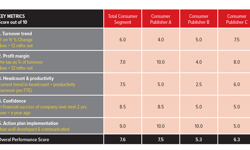
When traditional media was still pretty much the only show in town and the only way brands could get in front of their customers, there was enough money to go around to keep lots of publishing companies, of varying degrees of quality, afloat.
Now, ‘mediocre’ no longer cuts it. To succeed today, publishers must pursue excellence in everything they do.
Take B2B publisher Executive Grapevine as an example. They are a B2B publishing company servicing the HR and recruitment sectors through their brands HR Grapevine and Grapevine Leaders. The company began life in the early nineties as a traditional print publisher but has since transitioned into being, according to them, “one of the UK’s largest and most engaged online communities within the B2B sector”.
On their website, they say, “our core value is to create an outstanding user experience for all our clients, readers and employees”.

A clear, simple and compelling mission statement. If any publisher manages to deliver on that, assuming a viable market and sound financial management, then success is guaranteed.
Of course, it’s easy to be cynical about such mission statements. Words can be cheap and we’ve all seen examples of worthy mission statements, often crafted by external management consultants without full buy-in from senior management, that have gone nowhere.
Having interviewed Helen Fish, Executive Grapevine’s CEO in the summer, it seemed to me that she and her management team were fully invested in delivering that “outstanding” experience to all stakeholders.
Helen’s approach could be summed up as follows:
1. They invest in insight
Executive Grapevine has always invested heavily in research and understanding their audience’s needs, because, especially in the digital transformation journey they’ve been on, you’ve got “to walk the steps with your readers. You can’t have great products and ideas unless you know who you’re reaching out to.”
2. They do things properly
How you tackle challenges often says a lot about your company. Take GDPR as an example. Many publishers saw it as a major threat to their business models and spent much time trying to find ways to circumvent the legislation, delay its implementation or minimise the necessary changes. Executive Grapevine took the opposite approach: “We saw it as the biggest opportunity to take market share. GDPR was the catalyst for us transitioning from a traditional publisher to a marketing services business.”
Long term, Helen could see the benefit of having the kind of “engaged audience” that proper GDPR compliance would deliver, so they decided early on to transition to a fully “opt-in” audience.
In short, they didn’t fight the new rules, they embraced them and turned them to their advantage.
3. They measure everything
Helen puts the creation of a dedicated marketing and delivery team as one of the key developments in her company’s history. It is now their largest team. “We measure everything”, said Helen; “not every reader is equal and it’s important to be able to distinguish between different reader types.” They measure all the usual things around customer journey and user behaviour, but for Helen, the two key metrics are ‘time on page’ (“ultimately, I want to know how engaged a reader is”) and ‘do they go on to look at something else on the site (“I’m interested in sustainability; how do we retain and keep their interest?”).
4. They never stand still
Innovation and creativity are key ingredients of any company’s success – there should be a constant search for improvement: “We never stand still,” she said; “nothing is ever complete.” Furthermore, Helen says, she’s never believed in relaunches; “for me, change is something that happens daily.”
5. They employ great people
An important strand in successful leadership is to surround oneself with a great team. People are the most important thing and this has been particularly apparent during the pandemic where sensible companies identified and invested in the people most likely to carry the company through. “Putting people first is at the heart of our strategy,” said Helen.
Great leaders should nurture and welcome excellence within their teams and never feel threatened by it.
6. They do not let problems persist
“Be swift to act,” advises Helen. Leaders have to trust their judgement: “If you see something that’s not quite right, fix it; if you see an opportunity, grab it.”
7. They keep an eye on the numbers
“You’ve got to have a handle on business performance,” says Helen. You have to be on top of all the key performance indicators. The company’s financial situation should never come as a surprise.
8. They emphasise quality
Ultimately, quality is all. Delivering an “outstanding experience” for all stakeholders needs all parts of the business to be focused on the continual pursuit of excellence.
Those are eight approaches that would stand any company in good stead for a profitable future.
If you see something that’s not quite right, fix it; if you see an opportunity, grab it.

You can hear Helen Fish being interviewed by James Evelegh on a recent episode of The InPublishing Podcast, which was sponsored by Air Business, a leading supplier of distribution and subscription management services.
This article was first published in InPublishing magazine. If you would like to be added to the free mailing list, please register here.










